The Good, the Bad and the Ugly: The truth about the female adult model industry…
An investigation into the global state of the female model industry triggered an analysis of 9,687 female model profiles and 1,101 modeling agencies. The search for evidence revealed that 74% of models are underweight and that the industry is largely misrepresented. It showed the importance for a larger proportion of slim-size models in big agencies to gain a higher financial credit scoring. It could expose evidence that those younger female models in the data are at higher risk to be severely underweight and thus risk to develop weight-related health problems, more than their older counterparts. An analysis of modeling agency-businesses uncovered which of those are the biggest industry pollutants of employing most underweight young models. For the fun of it, the data was used to estimate the world’s most attractive fashion model country population, via an academic approach (hint - a place men might shout: “Bonza, mate, she’s a ripper”).
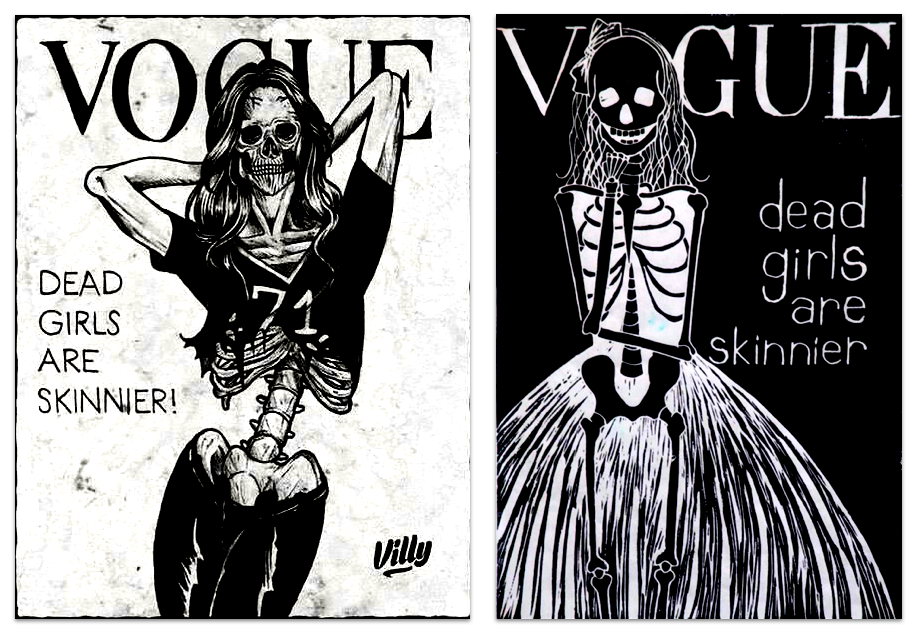
Image: Media.tumblr.com
Only who has what it takes - that is, a very particular body image - will have the opportunity to become a fashion model. Requirements are tough. At least that’s what I’d assumed when I started researching this story. Modeling blog posts, such as this one, authored by Jonah Levi Taylor don’t hide the fact that women ought to meet those tough body requirements before even playing with the idea of going into modeling.
“Mom, Google says I’m not tall enough & my waist would be too large for fashion modeling”
But do those numbers add up? How accurately are those measurement assumptions being met by professional models? Of course, there are different categories. From the noise in the fashion media, I assumed that the largest part is represented by high fashion modeling, catalog modeling, by lingerie and bikini modeling. I was proven wrong. It triggered a data-driven investigation into the female fashion world.
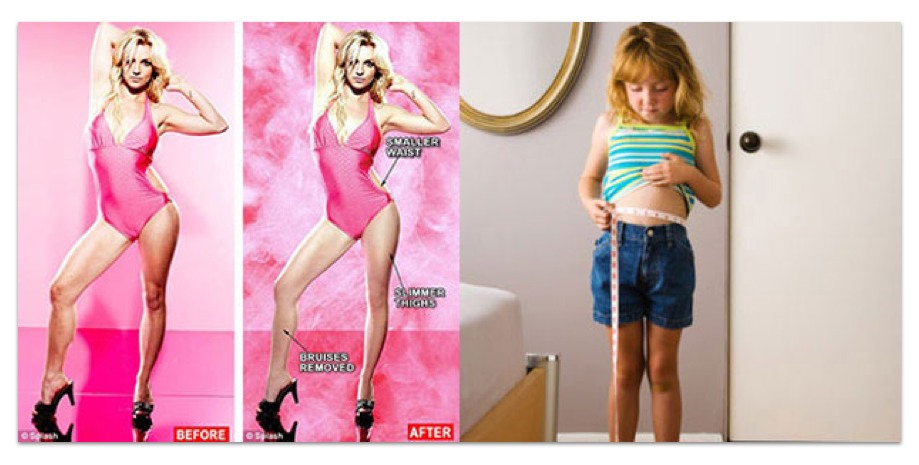
To my great surprise, it uncovered much more than I initially had hoped for. My deep-dive into the data from Fashionmodeldirectory.com (FMD) - a website that hosts female modeling information, their agencies, body measurements and personal information - tells an invaluable story of the current state of the global adult female modeling industry. Let me take you on a journey.
About 80% of female professional models are simply forgotten
Only about 22%, or 2,126 models from a total of 9,696 female models could comply with a fashion blogger’s seemingly arbitrary rules for body measurements (including all variations of measurements for high-fashion, catalog modeling, lingerie and bikini modeling). If you are either, a young lady or adult woman, playing with the idea of going into modeling, it is advisable NOT to listen to Jonah Levi Taylor’s suggestions for cut-off points, or alike. Those restrictions exclude the majority of the modeling market.
In a post on modelingwisdom.com, next to other unimpressive posts that carry headlines such as “How to get your Baby into Modeling” or “Why Can’t Models Be Short?”, the blogger claims that high-fashion models (or haute couture models) must be between 5’9″- 6″ tall, must have a bust of between 32″-36″, a waist between 22″-26″, and hips of between 33″-35″. If tested on up-to-date data for female FMD modeling profiles (status: November 2016), we learn that only about 14% of professional and successful models could comply with those “expert rules”.
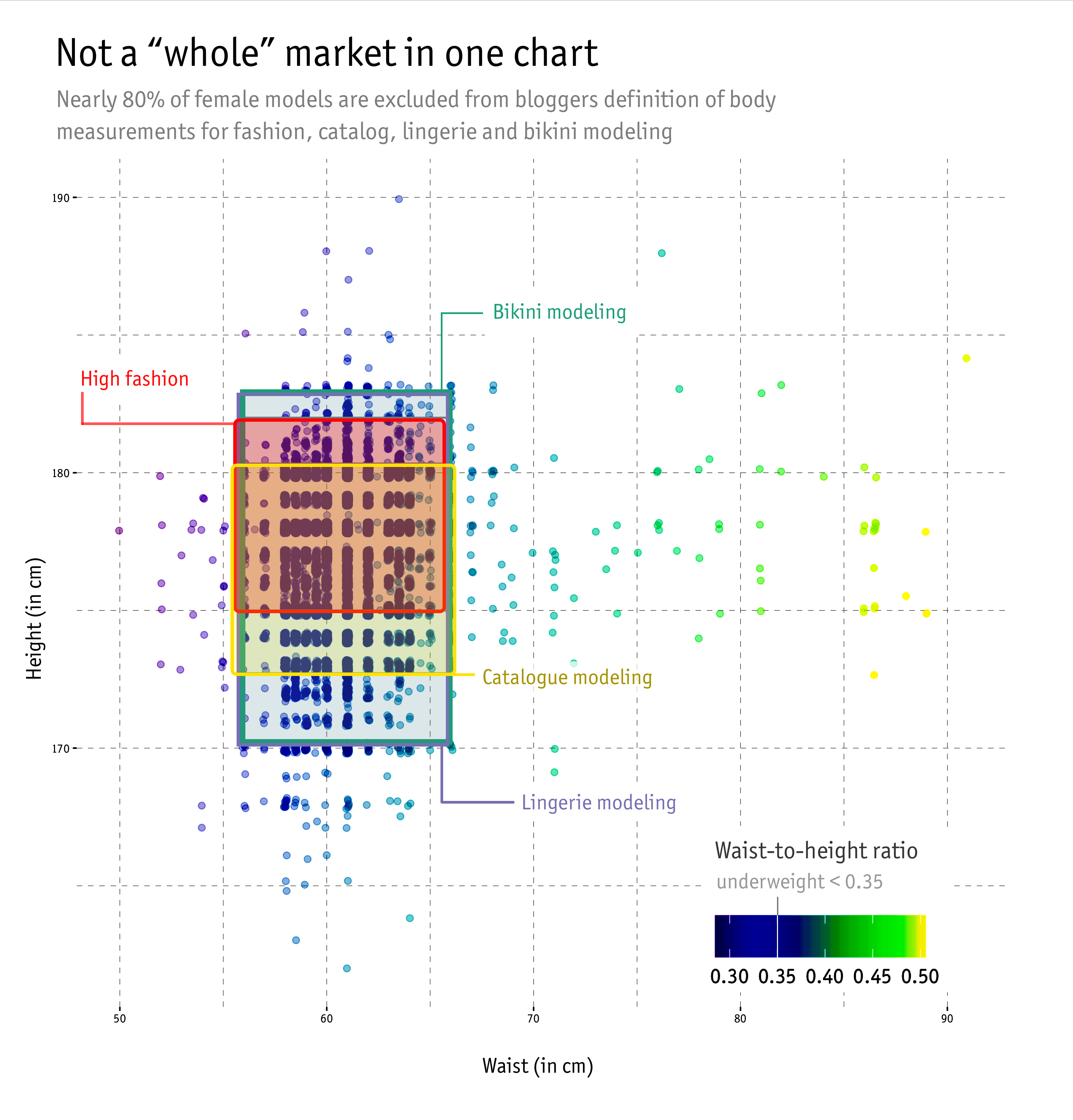 Chart: Only about 14% of models could comply with blogger’s claims on model’s body measurement requirements on high couture fashion, source: FMD
Chart: Only about 14% of models could comply with blogger’s claims on model’s body measurement requirements on high couture fashion, source: FMD
Of course - quite reasonably - one can argue that the model industry does not merely consist of high fashion models. If we include catalogue models too, considering Taylor’s recommended height measurements of between 5’8″ and 5’11”, a bust of 32″-35″, hips of 33″-35″, and waist of 22″-26″ (slightly less restrictive compared to high fashion models), only about 20% of professional models pass.
There are other areas. For Lingerie and bikini models, it’s a similar story. Only about 22% of models meet those standards of lingerie modeling. It needs a height 5’7″-6′, bust 32″-35″, waist 22″-26″, and hips 33″-35″. We are recommended to add a bit more space onto model’s bust, when hunting for bikini models. A reason is not given. For this, we add another 1-2 inches. For those cut-offs, we only can grasp 5-16%.
If we considered the abover all-together - this is, all possible variations from the modeling types from above - there is only about 22% that makes up the adult female fashion market, listed on FMD. The author hereby suggests that nearly 80% are dedicated to the rest, including fields like fitness modeling, glamor, and plus-size modeling that do not require such specific measurements. Can you smell the ignorance?
Similar cut-off claims have been made. Similar results were found on those claims (for instance from modelmanagement.com). It includes plus size modeling and reports a minimum height of 172cm, while the data shows a smaller height is well possible. Taylor’s blog post or those claims by Modelmanagement.com carry serious weight for those young girls, searching for advice online. They appear on the first page of search engines, and misrepresent how diverse the industry really is. For my own online search, both appear to be the top two sources found when searching for “What measurements do i need to be a model” on Google.
It is safe to say that those claims can’t be taken seriously if 8 out of 10 models are being ignored. Today’s modeling industry with the rise of the web seeks a much wider variaty of models. Whether thin, small, tall, black or white, the concept of diversity is in vogue, more than ever. Today’s diverse demand is in, and those body restrictions should’t really be of any reliable reference anymore.
Does the model industry need a new way to control for model’s health?
Let’s talk about health. It has now been nearly one year since the French government decided to pass legislation that makes fashion models provide a medical note to prove that they are healthy. It is similar to what other countries have already implemented - such as Italy, Spain and Israel. French legislators reasoned the change with high numbers of eating disorders and cases of anorexia. Anorexia affects between 30,000 – 40,000 people in France, 90% of whom are women (stats from 2008). It seems I’m in the right spot to dig deeper into the data.

The recent Victoria’s Secret Show 2016 in Paris in December came in real handy, and offered an opportunity to review on those legislative changes since its introduction. So far, nothing seems to have changed much. Victoria’s Secret (VS) could spark some hope for healthier looking models, on their own. The company belongs to a group of global and influential organizations, that is in the unique position to help change the perception, and to show what good looking, healthy and fit fashion models could look like.
The company’s oversight on model’s health and fitness impressed many. The retail giant and its models worked on their fitness and health branding together, over the last years. The effort seemed to have paid off. Victoria’s Secret’s attitude on contracting healthy and fit models seem to carry real weight, and VS influence is undeniable. 6.65 million people watched the show on TV this year - an increase from last year’s 6.60 million.
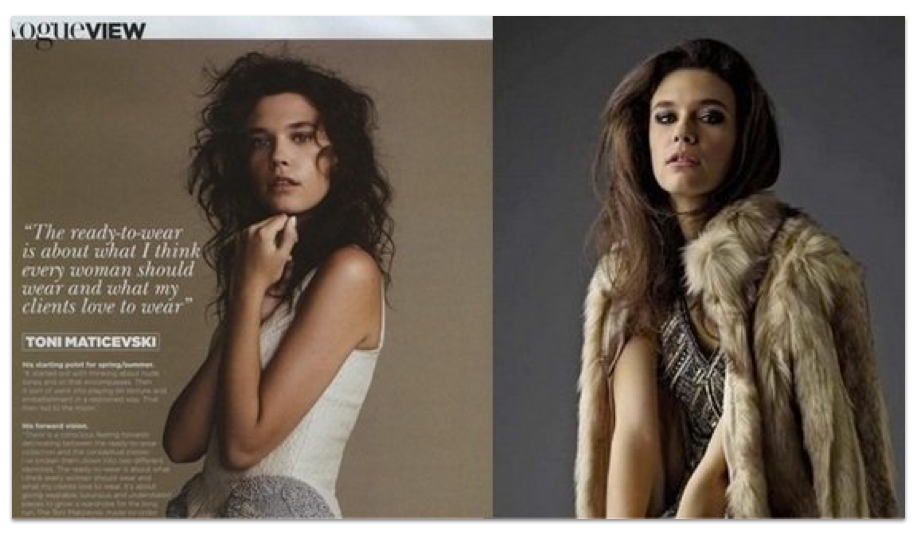
Rosie Nelson, a model herself, who started petitioning the UK Government to introduce legislation to stop the use of models who are unhealthily thin, pushes for the introduction of health checks. As far as she is aware, those legislations in France haven’t been put into full action yet. She did a catwalk show at Paris Fashion Week in September and encountered girls who she would consider underweight and not at the peak of their physical health. There was no mention of health certificates or physical health medical notes whilst she was there, she says. In her opinion, it is definitely one strong way forward for the industry, if it is managed and controlled in a responsible way.
Clean figures on underweight
Despite leaving off a direct judgement of who is unhealthy and who isn’t, by classifying underweight using waist and model’s height, 74% of models or 7,186 women, would fall in a critical range of a waist-height ratio below 0.35.
This can be classified as a state of underweight, but one single clear and strong guide couldn’t be found (It makes sense since everyone has a slightly different body shape. We will use the waist-height measure anyway since it’s the best we have as an underweight indication from the FMD data. 0.35 shall hereby serve us as cut-off guide value). The waist-height ratio is a measurement of the waist circumference divided by height (both in cm).
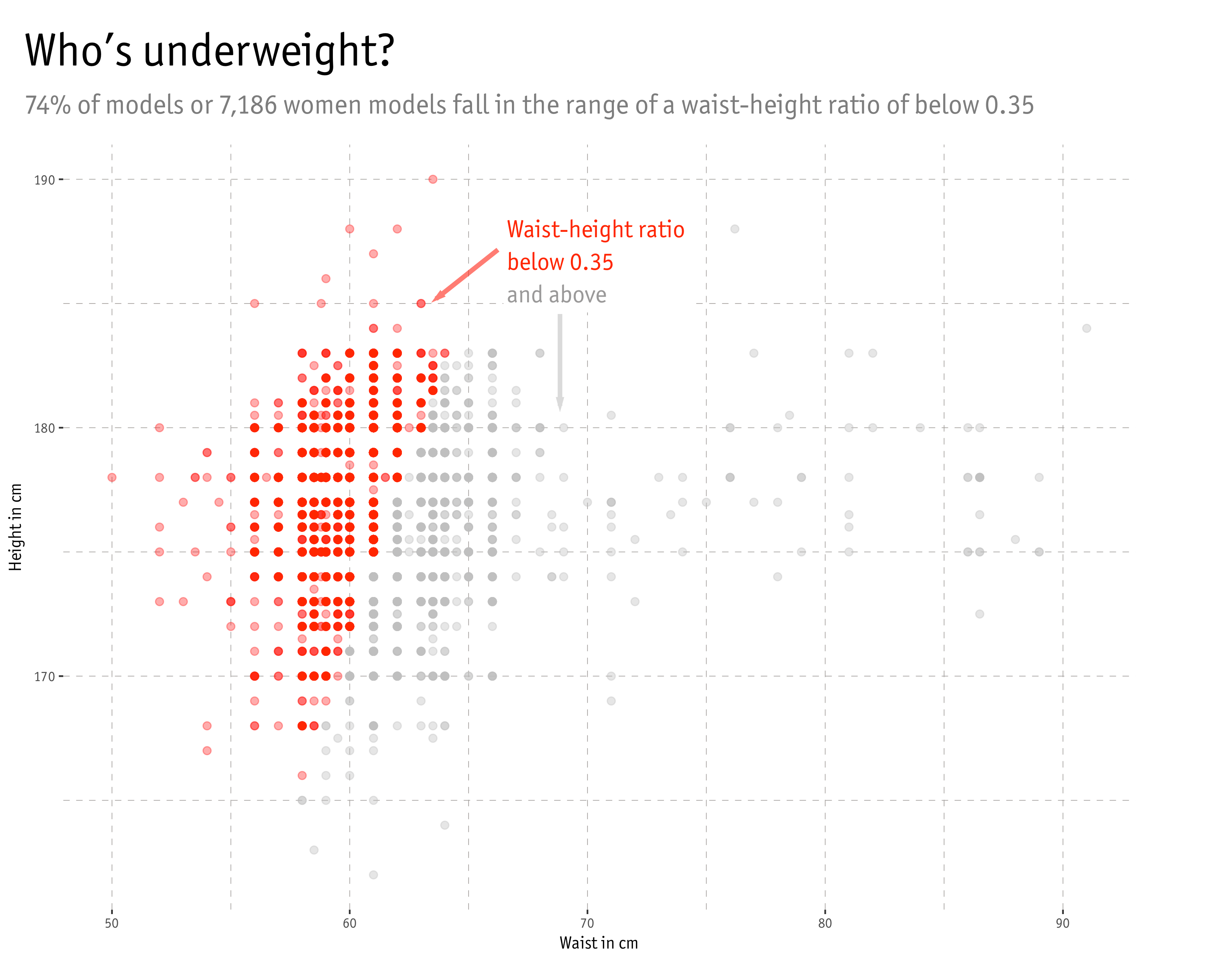 Chart: 74% of models in the sample have a lower waist-height ratio than 0.35, classifiable as underweight. source: FMD
Chart: 74% of models in the sample have a lower waist-height ratio than 0.35, classifiable as underweight. source: FMD
Health professionals report that for women who are severely underweight the risk is higher to suffer from amenorrhea (absence of menstruation), infertility and possible complications during pregnancy. It can also cause anemia and hair loss. Being underweight is an established risk factor for developing osteoporosis, even for young people. One typical measure is the BMI (the underweight definition usually refers to people with a body mass index (BMI) of under 18.5 or a weight 15% to 20% below that normal for their age and height group). A person may be underweight due to genetics, metabolism, drug use, lack of food, or illness - or, in some cases, due to body shape requirements set out by their modeling job.
Female Russian fashion models stood out with the lowest reliable average waist-height ratio, a victory which I could imagine no country would fancy wining. On average, those women were lying significantly below the 0.35 cut-off point. British (English) models made it closest to this mark.
 Chart: Distribution waist-height per country, source: FMD
Chart: Distribution waist-height per country, source: FMD
It is generally assumed that the average waist-height value among haute couture models is lower (lumpen designers think that their clothes look better on skinny models).
Let’s have a look at those models, exclusively. A second density chart has been drawn up (‘thanks’ to Taylor suggestions).
Now, Chinese women models have the lowest waist-height ratio while the Swedish are most modest, coming closest to 0.35. Models from Czech Republic, Lithuania, and Brazil reveal an interesting multimodal density distribution, indicated by two or more of those funny humps.
Mexican, Canadian and Spanish models have such multinomial behavior too, but with more than two humps.
 Chart: Distribution waist-height of high couture models, per country, source: FMD
Chart: Distribution waist-height of high couture models, per country, source: FMD
Current model squat by Victoria’s Secret
Above, I named Victoria’s Secret as possible instigator and trendsetter for more fit looking, more healthy models. We can see the current “Angel squad” represented in the scatterplot, comparing their waist and height to the rest of the industry.
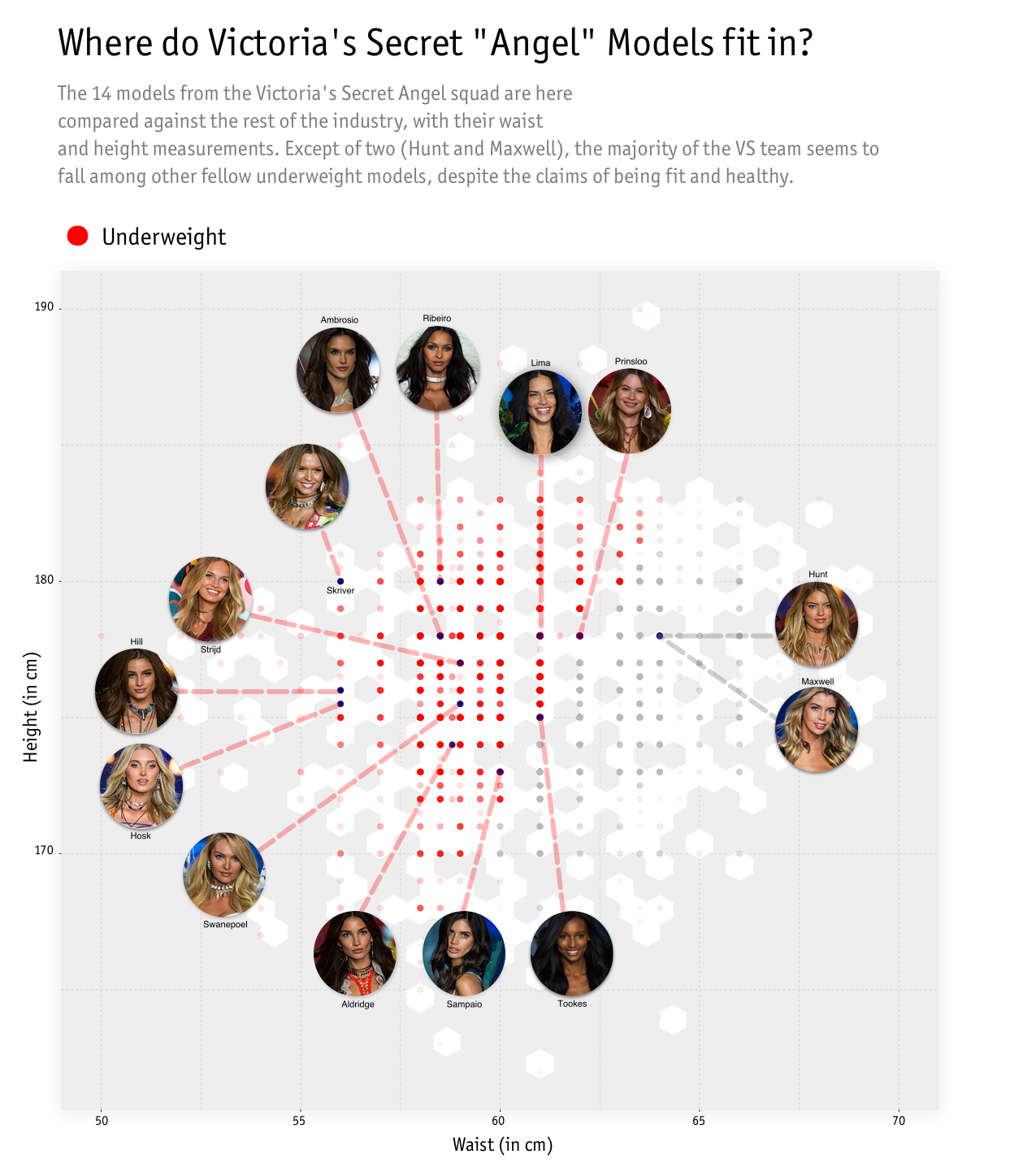 Chart: Current squat of Victoria’s Secret models, and their waist-height measurements, source: FMD
Chart: Current squat of Victoria’s Secret models, and their waist-height measurements, source: FMD
Josephine Skriver with a waist-height ratio of 0.31 is furthest away from the 0.35 waist-height ratio mark, making her the “thinnest” among the group. Martha Hunt with a ratio of 0.36 is closest to it, and didn’t even classify as underweight, which is applaudable. Needless to say, everyone has a different body shape, yet, all of those models have a somewhat healthy line.
This is because health and fitness of their models is top-priority, and VS is well in control of. Although, the data suggests that the average waist-height ratio of this year’s’ Victoria’s Secret Angel squad touches slightly below the 0.35 mark, there are several significant differences, argues Iva Mirbach, Editor-In-Chief at FMD: “The workout and shaping plan by Victoria’s Secret could serve well as a perfect standard for the industry. Models are also forced to have a healthy diet”.
Contracts Victoria’s Secret models sign are - funnily enough - secret. Nevertheless, the general assumption is that models are required to shape-up their body for a “healthy and muscular” figure, says Mirbach. (Angels should be 5ft 9in with a 24inch waist and no more than 18 percent of body fat). The training has consequences. Those requirements make those models drop significantly under the regular body mass index, but models have a higher proportion of muscle mass, something that is usually a good indicator for a healthy person.
Daniel Elliott, a specialist nurse at the department of feeding at the Great Ormond Street Children’s hospital in London says that low muscle mass is one of several important indicators to tell apart anorexia from healthy, thin bodylines (more sport and fitness would also increases the level of appetite, more naturally, he tells me on the phone).
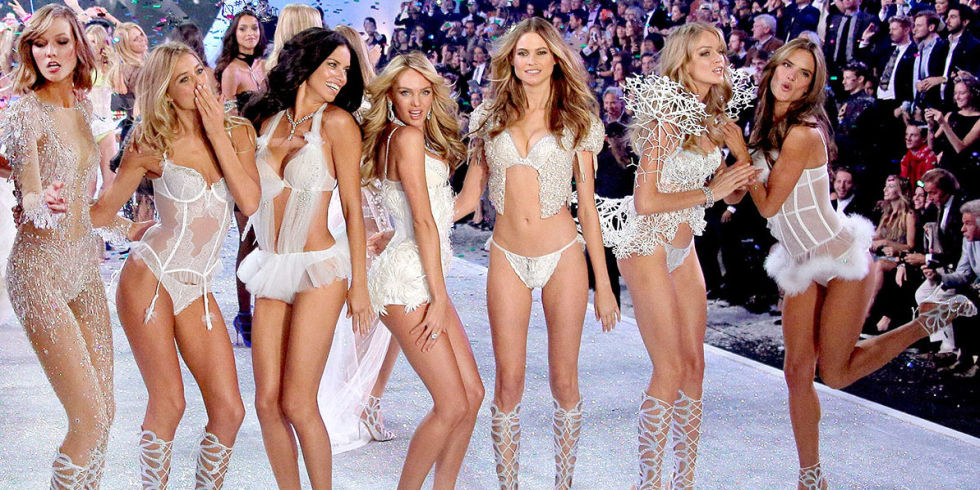 Image: Healthy Victoria’s Secret image via FitazFK
Image: Healthy Victoria’s Secret image via FitazFK
VS model’s muscular and healthy body shape is increasingly sought after by various large sports and fitness brands. One example is wearable technology that includes products such as fitness watches, that are increasingly being marketed and branded under the fitness and health umbrella. More demand of those sporty models could follow for mainstream fashion brands too, and reduce the risk that anorexic models will remain undetected and without help. Despite the opportunities, the opposite seems to be happening for male modeling at the moment, where less muscular body shapes are becoming higher in demand.
Measuring attractiveness
To get a feeling of how “attractive” models are within the FMD data, I conducted a little experiment, that was guided by results from a scientific study by Streeter and McBurney from the department of Psychology, at the University of Pittsburgh.
The researchers tested the perception of attractiveness of women, perceived by men. Hereby, the waist–hip ratio played an important role.
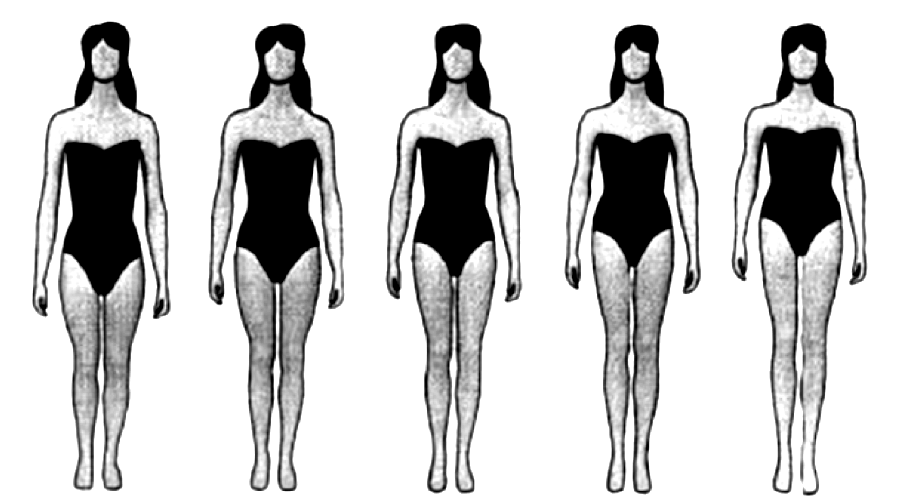
The study could confirm that waist–hip ratio (WHR) in women can be used as a suitable indicator for men in the sample group to judge attractiveness according to signals of health, youth, and fertility in potential mates. An evolutionary model could then predict that humans should prefer those honest signals.
The interesting bit is that an “optimum value” was determined. 0.7 waist-hip ratio was most preferred (which is in line with results from earlier studies). We can compare this to the FMD data points and get a detailed account on mean-value deviations from 0.7, for waist-hip ratios across model’s countries of origins.
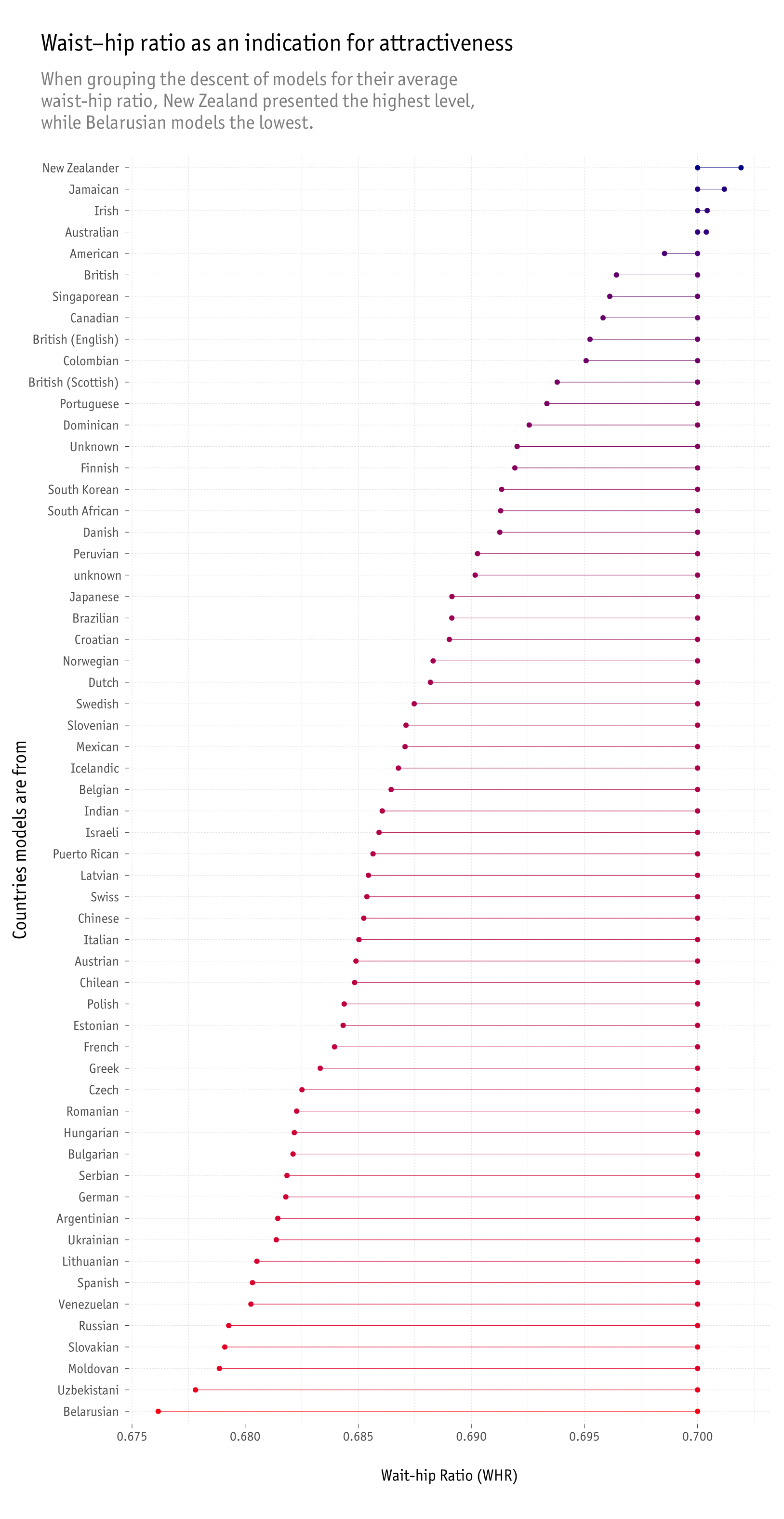 Chart: Mean waist-hip ratio values of model’s origins, and deviation from optimum waist-hip ratio of 0.7, source: FMD
Chart: Mean waist-hip ratio values of model’s origins, and deviation from optimum waist-hip ratio of 0.7, source: FMD
The deviations from the “optimum” is largest for Belarusians, which has a mean waist-hip value of 0.676 (72 women in the sample). 0.702 is the waist-hip ratio for models from New Zealand, which reached the highest average value (67 women in the sample). Most accurately, that is, - according to the result, most “attractive” - are models from Ireland (31 women) and models from Australia (357 women), who do deviate the least.
Remember those Victoria’s Secret models, we discussed earlier? Their average waist-hip ratio is 0.69. The squat only missed the 0.7 mark by a hair’s breadth.
If we break it down and compare the most represented countries in terms of their density distributions within the FMD sample, we learn that Slovakians are much much further away from the optimum than models from Australia (which almost perfectly hit the 0.7), Canada, America, Britain. All of those four western countries lean towards the right of the 0.7 mark. Whether this is a trend that might be influenced by a more diverse modeling sector, I can’t tell (but do leave a comment if you think you know more).
 blue line = country’s mean waist-hip ratio, red line = waist-hip ratio of 0.7 Chart: Density distributions of mean waist-hip ratio values of model’s origins, source: FMD
blue line = country’s mean waist-hip ratio, red line = waist-hip ratio of 0.7 Chart: Density distributions of mean waist-hip ratio values of model’s origins, source: FMD
If we perform a similar task for high-fashion models, Russian women are furthest away from the sweet spot of 0.7 waist-to-hip ratio.
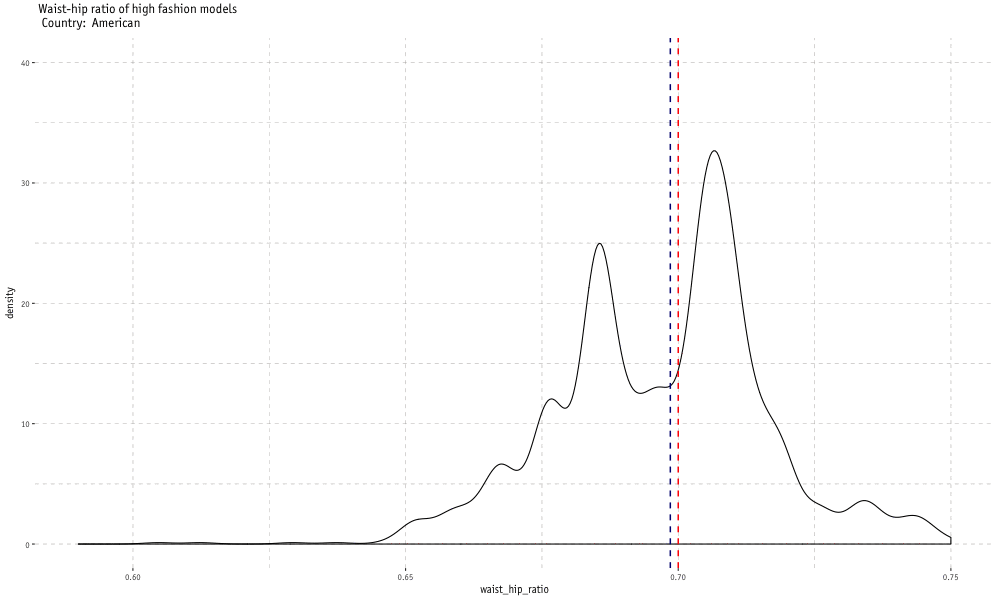 blue line = country’s mean waist-hip ratio, red line = waist-hip ratio of 0.7 Chart: Density distributions of mean waist-hip ratio values of high fashion model’s origins, source: FMD
blue line = country’s mean waist-hip ratio, red line = waist-hip ratio of 0.7 Chart: Density distributions of mean waist-hip ratio values of high fashion model’s origins, source: FMD
Age
Eating disorders can be an intense problem for teenagers and people in their early twenties. Recently, we could witness some - yet scattered - responses from the industry. For instance, there was Anna Wintour - British-American journalist and editor-in-chief of Vogue since 1988 - who made it a rule to never photograph girls under 16 years old or with a known eating disorder. This is applaudable. Data on hospitalizations caused by eating disorders fit into the picture. It can justify Anna’s take on it, and exposes the indsutry’s own illness. A high proportion of underweight models is found among younger models.
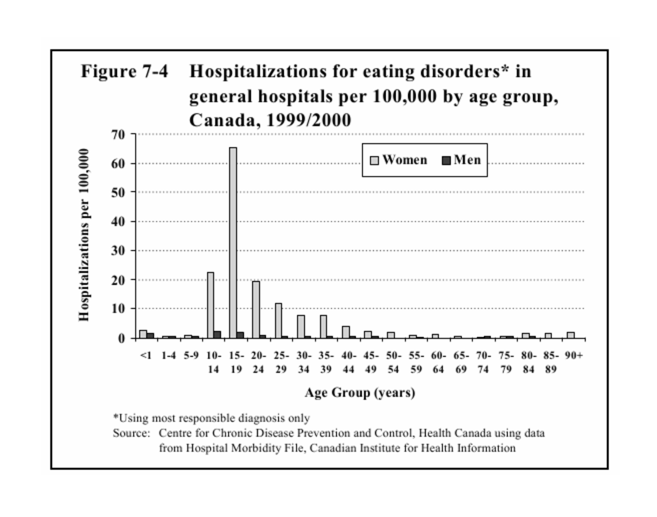
For around every third model in the FMD data, an age could be calculated. Although, the FMD data presented mainly profiles on adult models (18+), the highest proportions for models with a low waist-height ratio - < 0.33 or < 0.32 - was found for 18 to 22. This is in line with the chart on hospitalizations caused by eating disorders, above.
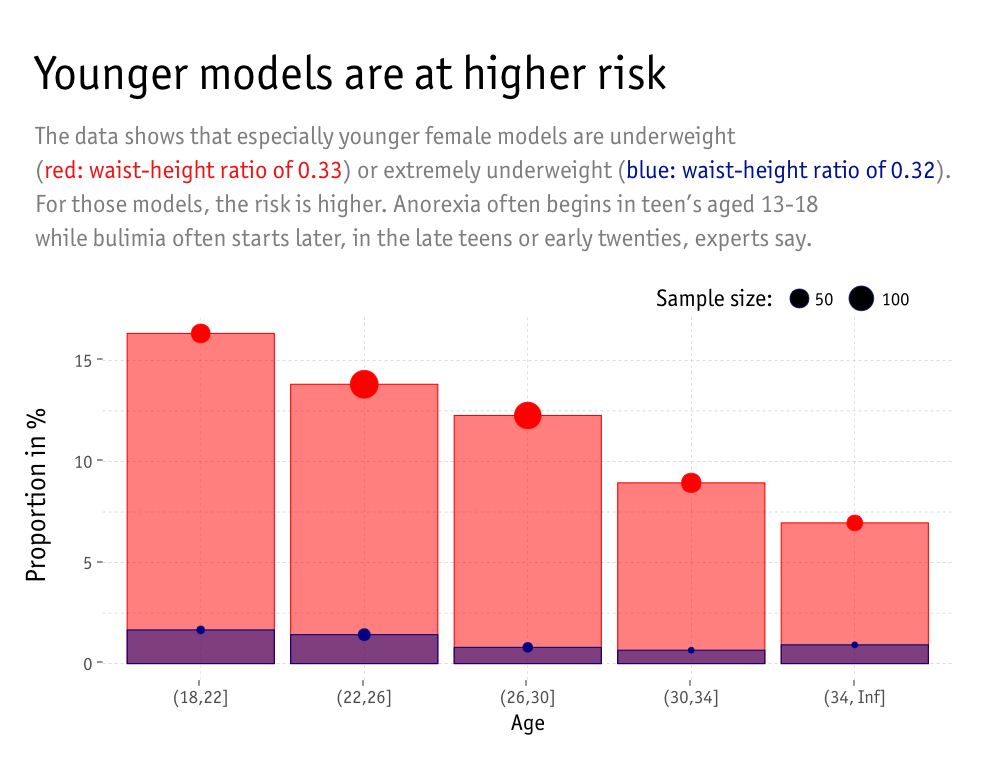
Chart: Age groups and proportions of models with a waist-height ratio smaller than 0.32 and 0.33, classified here as severely underweight, source: FMD
A golden age for older models?
High fashion models in the FMD data, have a median age of 29, which is higher than the median age of Victoria’s Secret Angels models of 26.5. From the experience of model agency owner Katarzyna Sawicka, I was told about a trend for a demand of older models.
Sawicka owns Gaga Models, a smaller Polish model agency in Poznań, a city on the Warta River in western Poland. She says that only a few years ago, she wouldn’t have agreed to take on girls within the age between 23 or 25. Back then, those were too old.
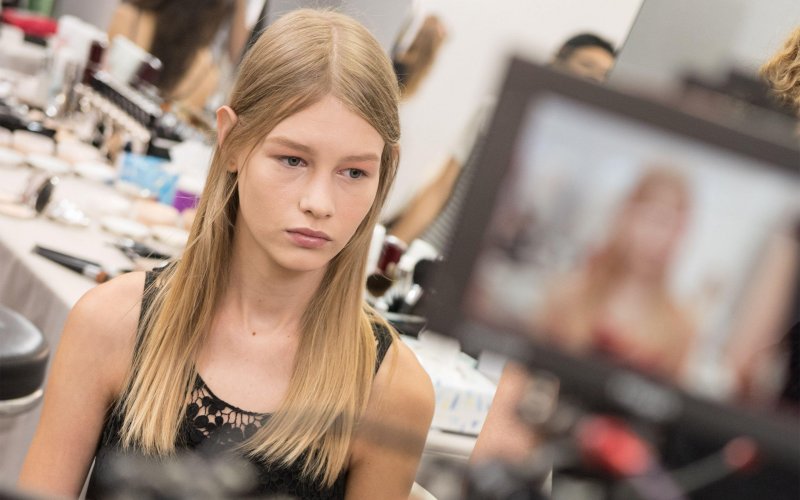 Image: “The media proclaimed ‘outrage’ over the young Israeli on the catwalk—but fashion’s obsession with youth is long-enduring”, source: thedailybeast.com
Image: “The media proclaimed ‘outrage’ over the young Israeli on the catwalk—but fashion’s obsession with youth is long-enduring”, source: thedailybeast.com
It’s a good thing that agencies scout for older women models these days. An approximately 2–4% of the young adult female population are assumed to suffer from full syndrome eating disorders. In the time between 16–20 years, the onset appears to be highest.
In addition, the analysis of the measurements from thos age-groups revealed that female models of 18 or under had one of the lowest mean value in waist measurements. Yet, those women were among the tallest.
The longer agencies can wait to lay their cold fingers on those younger models, the better.
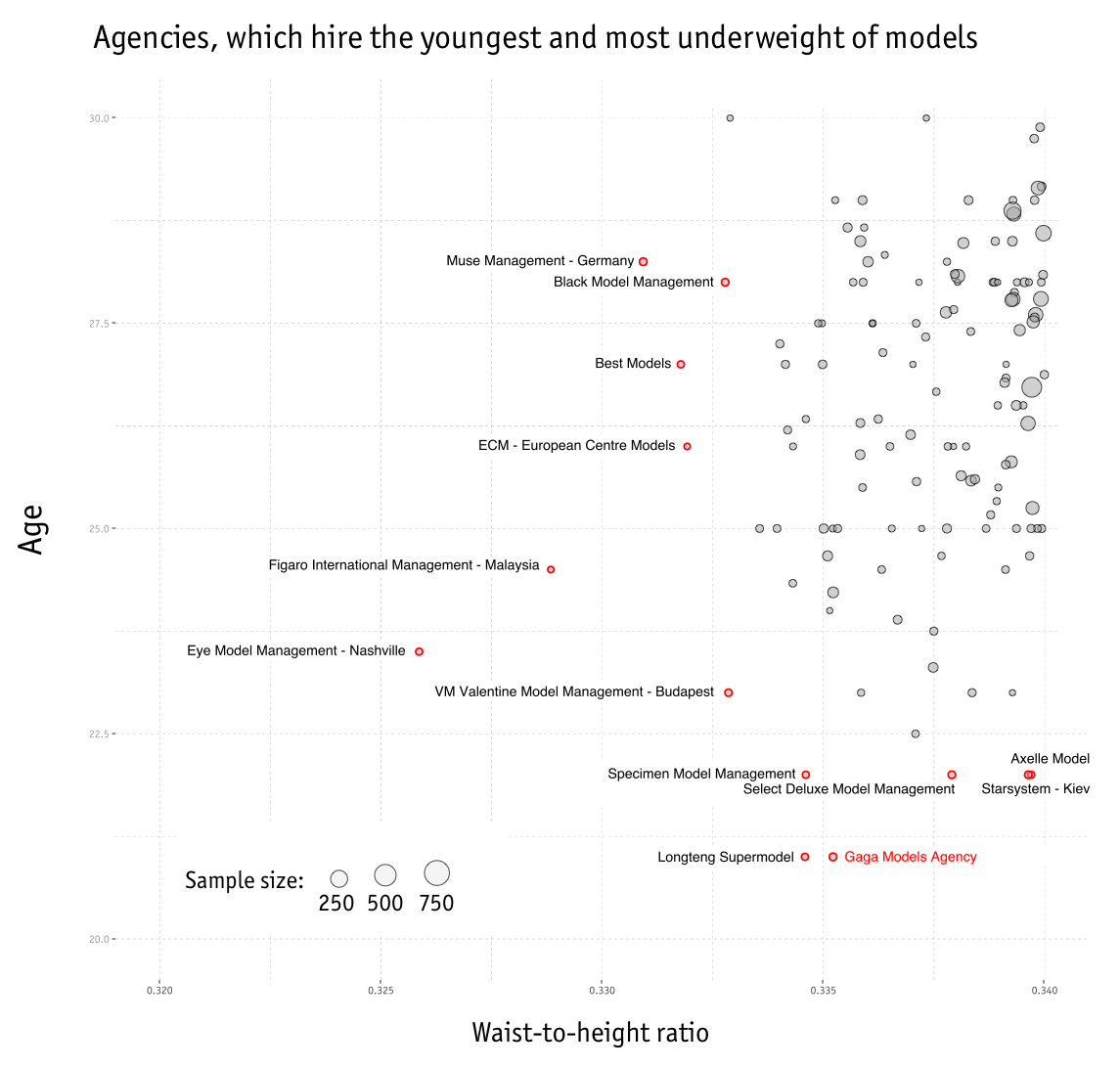 Chart: Agencies that hire the youngest, and most underweight models: Ten other model agencies that stood out, who decided to contract comparably young and underweight models are shown and annotated within the scatterplot. 3.4 representing agencies (FMD data) has each model on average. So, it could be possible that agencies share accounts. Source: FMD
Chart: Agencies that hire the youngest, and most underweight models: Ten other model agencies that stood out, who decided to contract comparably young and underweight models are shown and annotated within the scatterplot. 3.4 representing agencies (FMD data) has each model on average. So, it could be possible that agencies share accounts. Source: FMD
Sawicka’s agency, Gaga Models, showed up in the data with one of the lowest average scores for both, age of models and waist-height ratio (chart), but only accounted for a small sample. Other similar agencies include Supermodels Model Management (16 models) or Chantale Nadeau Model Placement (12 models), have a slightly larger sample and could be called out for that. Yet, those agencies dont account for the numbers that influence an entire industry.
Let’s take a look at those larger agencies.
Large in size with a high proportion of underweight models
One hundred modeling agencies with the largest proportion of dress size models 0-3 were filtered from the data to compare the ratio of 0-3 size models with the business success rating of those agencies. All of those have at least 100 models or more on the payroll.
The financial scoring accounts for the global market share and influence (a measure provided by the credit and reputation risk rating system, IFDAQ) of modeling agencies. A positive correlation could be found, and means a relationship might exist of a large proportion of thin models and agency’s financial scoring.
Sadly, it should be the other ways around. Agencies shouldn’t be rewarded for their effort to scout for the skinniest.
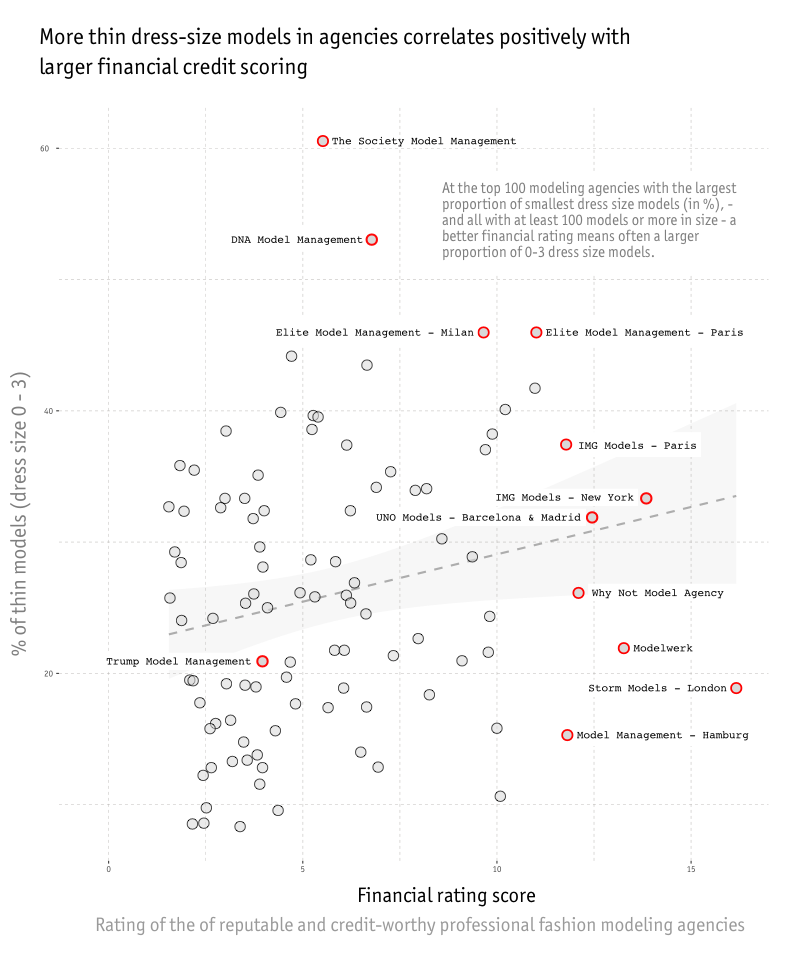 Chart: Correlation of overall size and ratio of 0-3 dress size models, source: Credit and Reputation Risk Rating System, IFDAQ
Chart: Correlation of overall size and ratio of 0-3 dress size models, source: Credit and Reputation Risk Rating System, IFDAQ
When purely looking at the agencies proportion of 0-3 size models, the business of The Society Model Management agency stands out by far with 66 0-3 dress size models out of 109. It accounts for the largest proportion among the list of agencies. Storm Models London sticks out as the largest modeling agency in the data. It has 1,266 models in their books, and wins also the competition for the agency with the largest headcount of 0-3 dress size female models (of 239). It also enjoys the highest financial rating score of 16.16.
One prominent public figure and his agency made it among those 100 accounts: Future US. president Donald Trump. The Trump model agency, with 21% (or 41 out of 196) of 0-3 dress size models, made it onto rank 64.
9 types of the Elite Model Management agency have been spotted, each responsible for different city or country location. Elite Model Management for Milan, Paris and Barcelona were among the top 10 with the largest proportion of 0-3 dress size models (each with around 45% of thin type models on their payroll). IMG Models, another company that has multiple offices for various city/country locations, accounted for five datapoints, whereby two of them (Milan and Sydney) rank among the top ten.
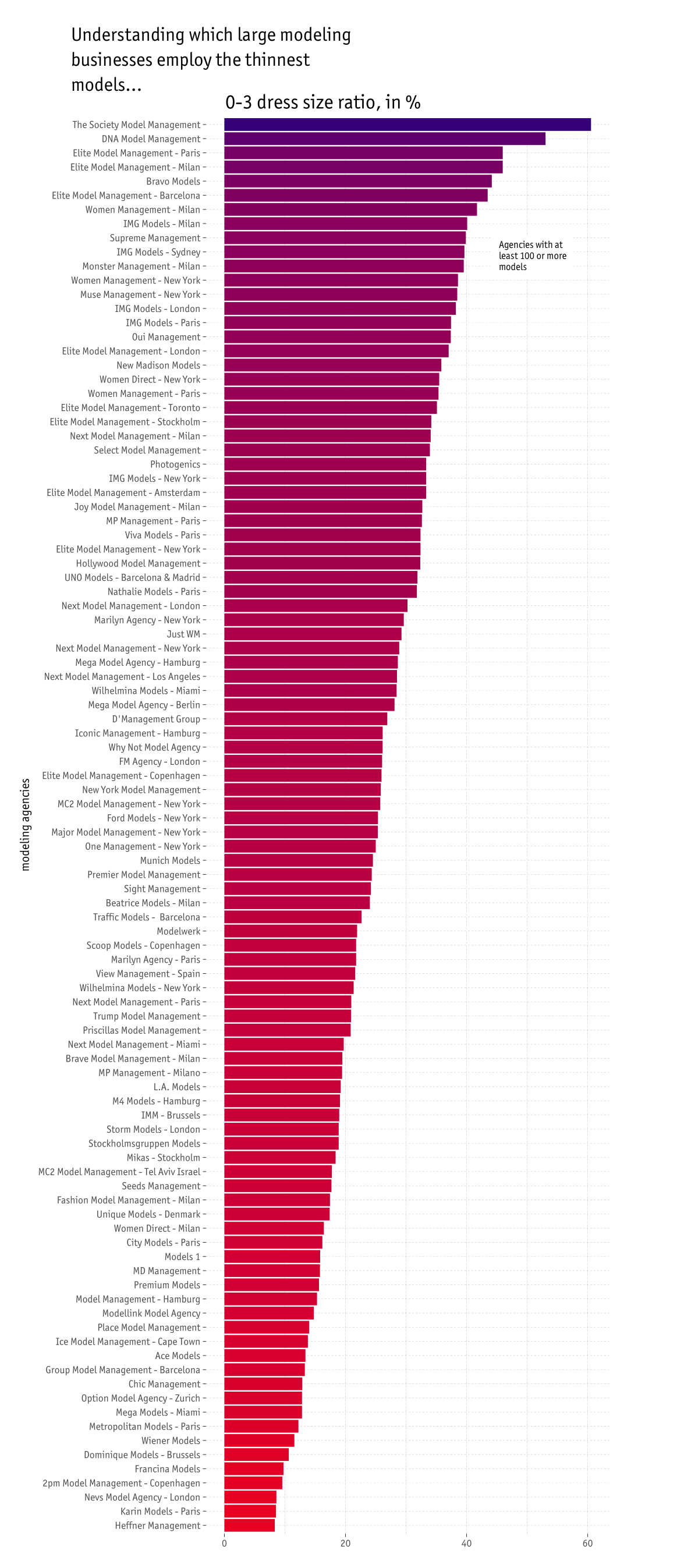 Chart: 100 agencies with the largest proportion of 0-3 dress size models and their ratios of such, source: FMD
Chart: 100 agencies with the largest proportion of 0-3 dress size models and their ratios of such, source: FMD
Of those agencies listed with a description of a subsidiary city office (e.g. Elite Model Management Paris) 14 were based in New York, 11 in Paris and Milan, and 6 in London.
Let’s improve
Rosie Nelson wrote in an email to me. She thinks that health should come first: “I think that modeling agencies would benefit hugely from focusing more on their model’s health rather than their size or measurements. There have been countless times where I have been rejected from a job just because my hips were an inch too big. The focus should be on whether a model is happy and healthy, in their mind and body, rather than the size of their jeans. “
To reduce model’s own responsibility - and to increase agencies investment in their health -, to fight anorexia and eating disorders, let me make some basic suggestions:
- Agencies must take more responsibilty
- A simple health check without management and enforcement, like France introduced it, makes little sense. Those legislations need proper oversight.
- Models shouldn’t be told by their agency to lose weight in the first place (why is this legal), especially female model already below their 0.35 waist-height ratio.
- Legislation and health authorities should have means to police and able to prosecute those agencies that would violate those rules.
- There should be legal responsibilities by agencies, in case things go wrong. For this, legislators should require to provide a minimum level of support. It simply shouldn’t be left to those models alone.
- Modeling agencies should be required to report on model’s health, similar to their financial reporting, to the government and health authorities. Such data points are invaluable to research, which can help to reduce eating disorders and anorexia within the industry.
Iva Mirbach from FMD wouldn’t want to claim that catwalk models are less healthy per se. The secret is the manner of how VS models stay in shape: “VS models are forced to have a healthy diet and regular sport to stay in shape as this is a part of the contract of Victoria’s Secret, whereas other non-VS-models can decide by themselves how they reach their goals as fashion models”. Since the group of VS models is also kept intentionally small (currently 14), better oversight can be provided.
At last, modeling agencies might learn a great deal from Victoria’s Secret’s approach*.
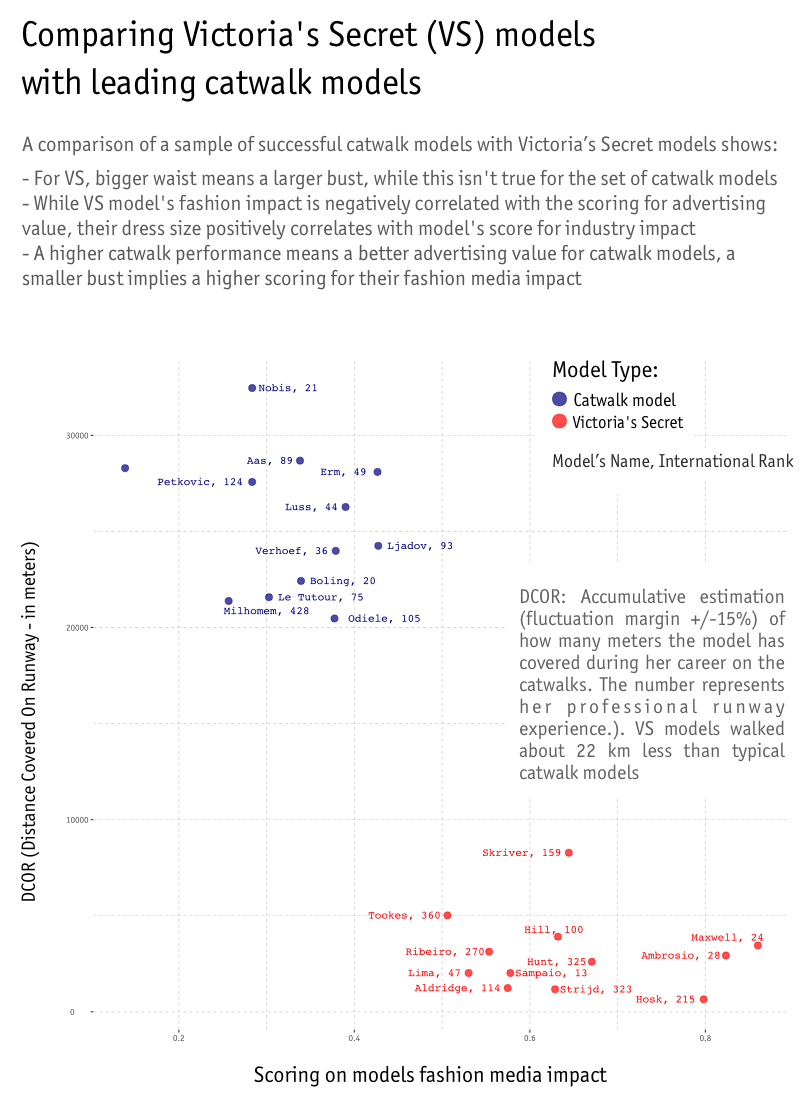 Chart: Victoria’s Secret vs. catwalk models: Catwalk fashion only represents a fraction of the female modeling industry, as we could see earlier. The distance walked on catwalks by the Victoria’s Secret Angel squat is only a tenth of what catwalk models have on their record. This shows a comparison of a sample of experienced and top-ranked catwalk models with the current set of VS models (two angels, Behati Prinsloo and Candice Swanepoel, are missing). Both groups, among the top ranked models among their industry, can be cleanly separated (blue, red). VS Model’s score higher on their fashion media impact than the set of successful catwalk models. Source: FMD
Chart: Victoria’s Secret vs. catwalk models: Catwalk fashion only represents a fraction of the female modeling industry, as we could see earlier. The distance walked on catwalks by the Victoria’s Secret Angel squat is only a tenth of what catwalk models have on their record. This shows a comparison of a sample of experienced and top-ranked catwalk models with the current set of VS models (two angels, Behati Prinsloo and Candice Swanepoel, are missing). Both groups, among the top ranked models among their industry, can be cleanly separated (blue, red). VS Model’s score higher on their fashion media impact than the set of successful catwalk models. Source: FMD
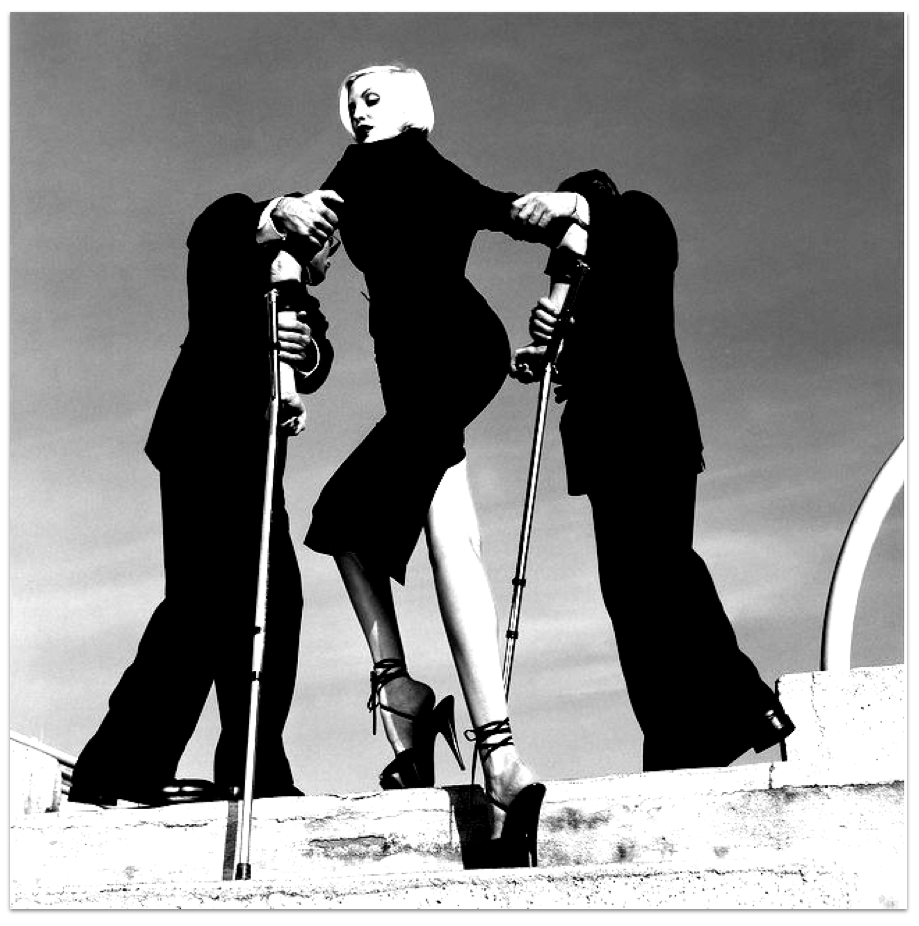
Image: By Helmut Newton High & Mighty Shoot, American Vogue, 1995: “Shoes: Pleasure and Pain” at Victoria and Albert Museum, London (2015)
*Despite the fact that VS is clearly not a modeling agency, it’s a brand, a retailer.

Leave a Comment